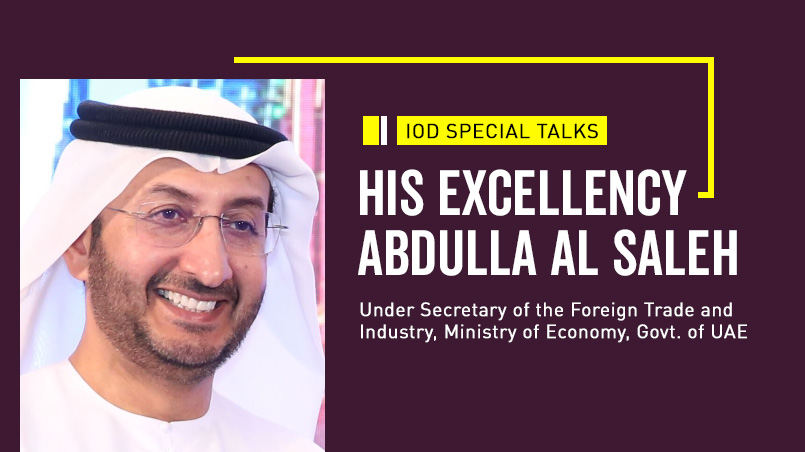 Connect with us
Connect with us

 Apr 02, 2024
Apr 02, 2024
Ladies and Gentlemen; Esteemed members of the Institute of Directors, Good Evening.
I am deeply honored to have been invited to address the distinguished participants of the IOD UAE Global Convention 2024, the 31st World Congress on Leadership for Business Excellence & Innovation and Presentation of Golden Peacock Awards. I extend my heartfelt gratitude to the Institute of Directors (IOD) for this esteemed opportunity. I commend the IOD for organising such a prestigious event in the UAE, a hub of innovation and business excellence, and for their valuable partnership with the Ministry of Economy. This collaboration underscores a shared commitment to fostering leadership, innovation, and economic growth. Thank you for bringing together leaders and innovators from around the world to inspire excellence and drive positive change."
Again, it is an honor to address you today on the crucial topic of good governance and its profound impact on economic development.
As we embark on this dialogue today, it is imperative to reflect on the historical evolution of economic thought and its influence on the governance of companies, government institutions, public benefit and non-profit organisations, and other bodies that shape policy and legislation, as well as the implementation of policies that significantly impact economic development.
The roots of modern economic thought can be traced back to the pioneering work of Adam Smith and his advocacy for economic freedom. Smith's seminal work, “The Wealth of Nations” emphasized the role of free markets, competition, and the invisible hand in driving economic prosperity. However, the landscape of economic governance has evolved significantly since Smith's time, marked by the increasing intervention of the state, interest groups, organisations, and political parties in policy formulation.
Let us remain steadfast in our commitment to upholding the highest standards of governance, thereby paving the way for a future defined by inclusive economic growth and opportunity for all.
Today, as we navigate the complexities of a globalized economy, the integrity of both formal and informal institutions, as well as the private sector, is of paramount importance in shaping policies that drive economic development. The influence these entities wield, whether positive or negative, can significantly impact the trajectory of a nation's economic growth and prosperity.
Let us consider some examples to illustrate these principles. Singapore, a small city-state, serves as a compelling case study in the transformative power of good governance.
Through a commitment to transparency, strong institutions, and effective policies, Singapore has achieved remarkable economic development, propelling it from thirdworld to first in just a few decades. The city-state's success is a testament to the pivotal role of governance in fostering economic growth and prosperity.
Conversely, we can look to countries where governance challenges have hindered economic progress. In some nations, corruption, weak institutions, and a lack of transparency have hampered the effective implementation of sound policies, resulting in missed opportunities for development and economic growth. These examples underscore the vital link between good governance and economic prosperity.
It is evident that when governance and integrity are upheld within these institutions, the outcomes for economic development are overwhelmingly positive. Sound policies, coupled with effective implementation, are the bedrock of sustainable economic progress. On the contrary, the failure of formal and informal institutions can undermine even well-crafted policies, resulting in stunted development and missed opportunities for growth.

This disparity has played a pivotal role in delineating between economically prosperous nations and those that continue to grapple with poverty and underdevelopment. The success stories of thriving economies stand as a testament to the power of good governance, while the struggles of others serve as a stark reminder of the consequences of governance failures.
Good governance plays a pivotal role in creating an environment conducive to economic development. Transparent and accountable governance structures build trust among investors, both domestic and foreign, fostering an atmosphere that encourages long-term investments and entrepreneurship. Moreover, effective governance mechanisms reduce uncertainty and risk, providing the stability necessary for sustainable economic growth. By promoting the rule of law, protecting property rights, and ensuring fair competition, good governance becomes a catalyst for innovation, productivity, and the efficient allocation of resources. Ultimately, it is through the lens of good governance that nations can unlock their full economic potential, paving the way for prosperity and well-being for their citizens.
Furthermore, the governance of the private sector and non-governmental organizations (NGOs) is equally instrumental in driving economic development. Ethical business practices, corporate accountability, and adherence to regulatory frameworks are essential components of effective private sector governance. When private enterprises operate with integrity and transparency, they become engines of economic growth, creating jobs, driving innovation, and contributing to overall prosperity. Similarly, NGOs, through their governance structures, play a vital role in addressing societal challenges, promoting social welfare, and complementing government efforts in areas such as healthcare, education, and poverty alleviation. By upholding high standards of governance, both the private sector and NGOs can maximize their positive impact on economic development, creating a more resilient and inclusive society.
Ladies and gentlemen;
As leaders in the realm of governance and management, it is incumbent upon us to champion the values of integrity, transparency, and accountability. By doing so, we can foster an environment where policies are formulated and executed with excellence, driving tangible and sustainable economic development
In the UAE's case, despite global economic uncertainty, our country has remained committed to its principles of economic diversification and openness while promoting good governance practices within its institutions through the strengthening of the legislative framework governing them. The most recent examples in this regard include:
(1.) The launch of the family business law to contribute to organizing the ownership and governance of family businesses in the country, followed by the launch of sustainable economic policies for the sector's continuous development.
(2.) The issuance of a law amending some provisions of the Federal Law on Arbitration to enhance arbitral proceedings and the governance of arbitration bodies in the country.
(3.) The issuance of the new Competition Law to address and mitigate monopolistic practices and foster a competitive environment conducive to economic growth.
(4.) Launch of the new e-commerce law. It has been designed to enhance the business environment in the country by facilitating the conduct of business and contracting; enhancing its efficiency; reducing the cost of doing business; and enhancing stability.
The positive impact of the country's proactive approach to driving sustainable economic development is evident in its recent economic performance. For example, the UAE's non-oil GDP rose by 5.9% in the first nine months of 2023, and we estimate the non-oil sector closed the year at this same growth rate. Moreover, in 2022, the UAE's GDP growth was among the highest anywhere in the world, growing by 7.9% in real terms, with the non-oil sector expanding by 7.2%.
With regard to investment flows, the value of inward FDI movement to the UAE in 2022 amounted to USD 22.737 billion (AED 83.5 billion), up by 10 percent or USD 2.07 billion (AED 7.6 billion), to rank 16th globally that year.
Moreover, to support investments and open up new avenues for growth for our national exports, we are diversifying our network of trading partners by expanding and signing comprehensive economic partnership agreements. CEPAs have been signed so far with key emerging markets and developing countries such as India, Indonesia, and Turkey, and we will announce in few months seven other agreements offering our companies access to markets of more than 2 billion consumers.
UAE's non-oil foreign trade reached a record-breaking $953 billion in 2023, significantly increasing from the $600 billion recorded the year before.
Trade between the country and its top 10 crucial foreign partners expanded by 26 percent last year.
Ladies and gentlemen;
In conclusion, the importance of good governance in shaping economic development cannot be overstated. It is a foundational pillar upon which the prosperity of nations rests. As we engage in critical discourse and decision-making, let us remain steadfast in our commitment to upholding the highest standards of governance, thereby paving the way for a future defined by inclusive economic growth and opportunity for all.
Thank you.

Bringing a Silent Revolution through the Boardroom
Institute of Directors (IOD) is an apex national association of Corporate Directors under the India's 'Societies Registration Act XXI of 1860'. Currently it is associated with over 30,000 senior executives from Govt, PSU and Private organizations of India and abroad.
Owned by: Institute of Directors, India
Disclaimer: The opinions expressed in the articles/ stories are the personal opinions of the author. IOD/ Editor is not responsible for the accuracy, completeness, suitability, or validity of any information in those articles. The information, facts or opinions expressed in the articles/ speeches do not reflect the views of IOD/ Editor and IOD/ Editor does not assume any responsibility or liability for the same.
About Publisher

Bringing a Silent Revolution through the Boardroom
Institute of Directors (IOD) is an apex national association of Corporate Directors under the India's 'Societies Registration Act XXI of 1860'. Currently it is associated with over 30,000 senior executives from Govt, PSU and Private organizations of India and abroad.
View All BlogsMasterclass for Directors
Categories